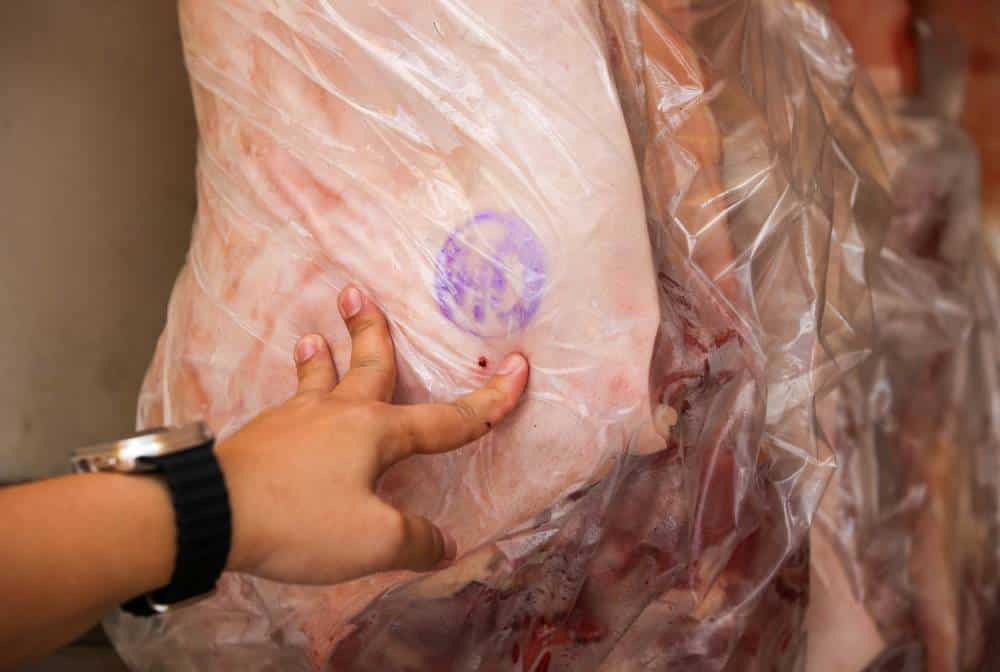
Staff from the City Veterinary Office (CVO) of Marikina City Meat Inspection Unit inspect freshly slaughtered carcass inside a delivery van that just arrived at their Single Port Entry site on August 15, 2024. All meat products must pass through checking here before delivery in public markets, supermarkets, restaurants and other sellers in the city. The CVO requires the meat delivery trucks to also be registered with them and in good working condition. Carcass hung from the hooks must also have plastic wrapping at the end to prevent blood from dripping to the floors and to minimize contamination as these products are loaded and taken from the vehicles, especially with the problem of African swine fever (ASF). Marikina has no slaughterhouses and gets supplies from Antipolo City, Quezon City, Rizal, Bulacan and Tarlac provinces. (INQUIRER /LYN RILLON)
The government has deployed additional veterinarians to inspect slaughterhouses in the Philippines, bolstering efforts to combat African swine fever.
Roberto Umali, deputy director of the National Meat Inspection Service (NMIS), said additional veterinarians were assigned to check on slaughterhouses to take “immediate action” in case of a differential diagnosis.
In meat inspection, differential diagnosis involves identifying possible conditions that exhibit symptoms of animal diseases such as ASF.
Umali said regular or spot inspections are carried out regularly to ensure that meat products are safe for consumption.
“Yung monitoring, spot-to-spot ‘yan. Hindi mo alam kung kailan darating po. Magka-countercheck ‘yan sa slaughterhouses,” Umali said on the sidelines of the Philippine-British Meat Trade Mission Year-End Gathering in Makati City.
(Spot-to-spot monitoring is conducted. You will not know when it will arrive. It will countercheck slaughterhouses.)
The NMIS, a specialized regulatory agency under the Department of Agriculture, is the country’s sole national controlling and competent authority on matters related to meat inspection and hygiene for locally produced and imported meat.
Umali said tapping more veterinarians forms part of a broader collaboration with the Bureau of Animal Industry (BAI) to avoid the risk of infected animals entering slaughterhouses.
He explained the ongoing dialogue between the BAI, NMIS and operators and dealers to avoid the closure of slaughterhouses just because an infected hog entered a slaughter house.
“May mga proposal kasi ngayon, ang problema natin… Ang may kasalanan, dealer. Bakit isasara yung slaughterhouse? May mga question na gano’n. Ito yung gustong gawin ngayon,” he noted.
(There are proposals to resolve this issue. The dealer is responsible for the infiltration of infected hogs, yet slaughterhouses are often blamed for this. These questions have been raised in our dialogues, and they want these to be addressed.)
“Papaano… kasi on the part of the negosyante, especially the slaughterhouse operators, masakit yun, masaraduhan ka,” he said.
(For entrepreneurs, especially slaughterhouse operators, the closure of these facilities affects their business.)
In a move to reduce the risk of spreading animal diseases, the DA earlier ordered the establishment and operationalization of livestock, poultry and meat inspection sites in strategic locations within and near Metro Manila.
Although the BAI’s National Veterinary Quarantine Services Division maintains major interregional checkpoints, there are no strategic inspection sites in the National Capital Region, a major destination for livestock and poultry commodities from South Luzon provinces to the North Luzon provinces and vice-versa.
This is outlined in Administrative Circular No. 10 which the DA issued after the resurgence of ASF in Calabarzon (Cavite, Laguna, Batangas, Rizal, Quezon) and the detection of new cases in other previously free areas.
The DA is also reviewing the existing regulations governing the transport of livestock products such as chicken and pork to address supply problems caused by lingering animal health issues and manage price spikes during the holiday season.
As of Nov. 6, there are active ASF cases in 20 provinces in six regions, based on the BAI’s data.